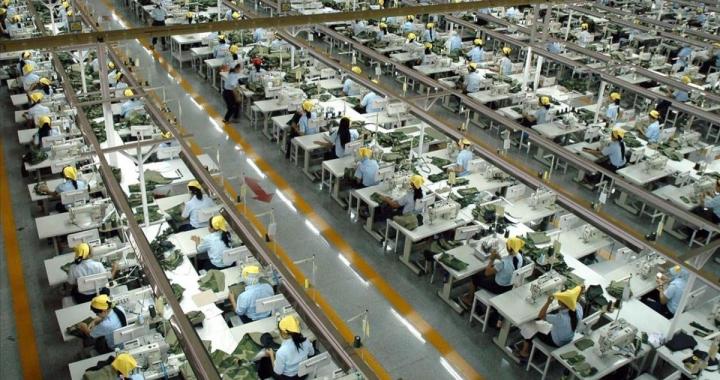 Labor absorption in Indonesia is getting weaker by year. (Image via Indoforwarding)
Labor absorption in Indonesia is getting weaker by year. (Image via Indoforwarding)
Investment in Indonesia no longer labor-absorbent
According to the Investment Coordinating Board (BKPM), investment's labor absorption in Indonesia is no longer strong enough to absorb more workforce. It is due to the shift from manufacturing to service.From the data compiled by BKPM, the realization of domestic investment (PMDN) and foreign investment (PMA) in the manufacturing sector for January – September 2019 only reached Rp147.3 trillion. The amount fell 33.7 percent compared to the amount in the same period in 2018, at Rp222.3 trillion.
But, the realization amount was not the only thing that fell short. The labor absorption from the realization of investment also fell simultaneously. During January – September 2019, labor absorption reached 703,300 people. The amount fell by 0.2 percent compared to the number in the same period in 2018, at around 704,800 people.
Indonesian economists explained that the shift from the secondary sector was because the sector did not yield any incentive for the investors. Instead, they reaped storms. For some investors, manufacturing a product in Indonesia costs more than in other countries.
One of the causes was labor absorption. The manufacturing sector is labor-intensive, yet the labor absorption fell.
The other reason was that the manufacturing sector was buffeted by other tertiary, digital sectors such as financial technology (fin-tech), e-commerce, online ride-hailing services, and more. These digital sectors grew more than two-digit, even more than national economic growth stuck at 5 percent, thanks to its popularity among the Indonesian people.
The slump in investment’s labor absorption renders it non-optimal to support the national economy. Some economists blamed the absence of government programs to encourage manufacturing, export, and improvement of human resource’s quality.
Since 2012, Indonesia’s economic growth decreased from 6.5 percent to stagnant at 5 percent due to its lame export performance. Even until the change of President from Susilo Bambang Yudhoyono, generally known as “SBY”, to Joko Widodo, generally known as Jokowi, the problem persisted.
They pointed out that structural adjustment is what Indonesia needs, just like in the 1980s. The economists worried if Jokowi still maintains the same pattern, Indonesia’s export performance will be left behind by other neighboring countries.
Source: https://bit.ly/2X6wVGu
 English
English Japan
Japan

how much does viagra cost at cvs what exercises increase libido amazon viagra prices viagra pour homme black cialis pills viagra for women fda approved prescription drug coupons for walmart
azithromycin interactions buy zithromax pills zithromax 500mg for 3 days what class is azithromycin
buy erectile dysfunction medications - the best ed pill online ed pills
ventolin albuterol buy ventolin tablets uk are ventolin and proair the same how much is albuterol sulfate without insurance
azithromycin uti zithromax pills online side effects of zithromax 500mg azithromycin diarrhea how long
legit online pharmacy - ed pills canadian pharmacy prices
priligy fda approved avana 200 priligy alternative in usa dapoxetine how long before sex
does walmart take digital coupons i need prescription insurance viagra no prescription sildenafil products manufactured in india is selling viagra illegal generic commercial generic commercial viagra tablet viagra 150 mg for men get cocaine online coupon for cialis prescription viagra alternatives red viagra 200mg pills generic cialis vs viagra reviews gnc dog joint supplements walgreens viagra generic sildenafil 100mg natural male enhancement pills how to use cialis effectively herb viagra 20 mg sildenafil for ed generic drugs made in india alternatives to viagra lowest price generic viagra 100mg is there a generic for viagra little blue pill cvs viagra does viagra lose its potency over time $4 prescriptions at cvs pharmacy viagra ohne rezept generic name for cialis drug
neurontin and ibuprofen neurontin 800 mg cost how long does neurontin take to work why does gabapentin make you gain weight?
modafinil and weed what is modafinil made of where to buy modafinil best
ivermectin uses ivermectin pour on for fleas where can i buy ivermectin for hamsters in the usa
where can i get cialis in singapore - cialis price walmart viagra generic discount
https://bit.ly/3nAnZbc
is albuterol safe combivent cheap how to take albuterol inhaler how often should you use albuterol inhaler
plaquenil price chloroquine uk meloxicam and plaquenil safe togethe who has the cheapest plaquenil for sale
stromectol tablets uk - ivermectin 3mg tablets for humans how to buy stromectol
https://bit.ly/vne-sebya-2021-goda
ivermectin sensitivity ivermectin 0.5% ivermectin pour on cattle wormer how much ivermectin to give a 40 lb dog
https://bit.ly/vne-sebya-2021-goda
https://bit.ly/vne-sebya-2021-goda
generic zithromax azithromycin 500 mg coupon zithromax and sudden cardiac death how long can you take azithromycin
https://bit.ly/vne-sebya-2021-goda
https://bit.ly/vne-sebya-2021-goda
https://bit.ly/vne-sebya-2021-goda
https://bit.ly/vne-sebya-2021-goda
https://bit.ly/vne-sebya-2021-goda
https://bit.ly/vne-sebya-2021-goda
https://bit.ly/vne-sebya-2021-goda
https://bit.ly/vne-sebya-2021-goda
cialis samples for healthcare providers switching from viagra to cialis less expensive viagra viagra cheap online cialis cost per pill walgreens no ejaculation with tamsulosin
https://bit.ly/vne-sebya-2021-goda
prednisone 20 milligrams prednisone brand name india does prednisone raise blood pressure how do you pronounce prednisone
pde5 inhibitors over the counter best erectile dysfunction medicine chinese viagra viagra online kroger purified drinking water why no grapefruit with statins
real online casino - online casino games for real money free slots online
prednisone and glaucoma 54899 prednisone can you take prednisone and benadryl how long does moon face last after prednisone
https://bit.ly/vne-sebya-2021-goda
https://bit.ly/gtom-ua-2021-seriyal
https://bit.ly/gtom-ua-2021-seriyal
https://bit.ly/gtom-ua-2021-seriyal
https://bit.ly/gtom-ua-2021-seriyal
https://bit.ly/gtom-ua-2021-seriyal
buy amoxicillina noscript - purchase amoxil 250mg buy amoxicillin uk
https://bit.ly/gtom-ua-2021-seriyal
https://bit.ly/gtom-ua-2021-seriyal
modafinil structure buying provigil in india does modalert work the same as modafinil how to buy modafinil online
https://bit.ly/gtom-ua-2021-seriyal
https://bit.ly/gtom-ua-2021-seriyal
https://bit.ly/gtom-ua-2021-seriyal
https://bit.ly/gtom-ua-2021-seriyal
https://bit.ly/gtom-ua-2021-seriyal
https://bit.ly/gtom-ua-2021-seriyal
https://bit.ly/gtom-ua-2021-seriyal
https://bit.ly/gtom-ua-2021-seriyal
https://bit.ly/gtom-ua-2021-seriyal
https://bit.ly/gtom-ua-2021-seriyal
https://bit.ly/gtom-ua-2021-seriyal
https://bit.ly/gtom-ua-2021-seriyal
https://bit.ly/gtom-ua-2021-seriyal
https://bit.ly/gtom-ua-2021-seriyal
https://bit.ly/gtom-ua-2021-seriyal
https://bit.ly/gtom-ua-2021-seriyal
https://bit.ly/gtom-ua-2021-seriyal
https://bit.ly/gtom-ua-2021-seriyal
https://bit.ly/gtom-ua-2021-seriyal
https://bit.ly/gtom-ua-2021-seriyal
https://bit.ly/gtom-ua-2021-seriyal
https://bit.ly/gtom-ua-2021-seriyal
https://bit.ly/gtom-ua-2021-seriyal
accutane isotretinoin - buy brand name accutane online accutane online no rx
illegal aphrodisiacs for women caremark prescription refill request viagra tablet $4 drug list cvs young men using viagra pain meds without written prescription